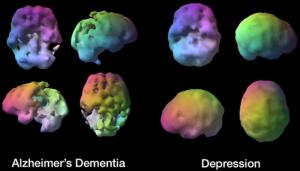by
Lauren Dubinsky, Senior Reporter | February 16, 2017
Alzheimer's disease and depression present with similar symptoms, making it difficult to tell the disorders apart. A new study published in the
Journal of Alzheimer's Disease found that SPECT imaging is capable of making the correct diagnosis.
About half of individuals with late onset depression show signs of cognitive impairment and 9 percent to 65 percent of patients with dementia also have depression, according to the researchers.
"These disorders have very different prognoses and treatments and being able to improve diagnostic accuracy can improve outcomes for some patients," Dr. Daniel G. Amen, lead researcher and psychiatrist, said in a statement.




Ad Statistics
Times Displayed: 39841
Times Visited: 1095 Stay up to date with the latest training to fix, troubleshoot, and maintain your critical care devices. GE HealthCare offers multiple training formats to empower teams and expand knowledge, saving you time and money
Depression is usually diagnosed with a tool called Beck Depression Inventory, in which the patient answers a series of questions. But the researchers argue that the inventory reveals no statistically significant difference between those with depression and cognitive disorder compared to those with either condition.
Amen and his team recruited 4,541 individuals for the study — 847 were diagnosed with dementia, 3,269 with depression and 425 with both disorders. They then had each participant undergo brain SPECT exams.
The data reveals that those with cognitive disorders had reduced blood flow in multiple areas of the brain compared to those with depression. The parts of the brain affected were the hippocampus, temporal and parietal lobes.
The study also found that SPECT can differentiate depression from cognitive disorder with 86 percent accuracy, and depression from dementia in those with both with 83 percent accuracy.
"One of the greatest new insights of the past decade is the linkage of depression to the psychology of late-life cognitive decline," George Perry, editor-in-chief of the journal, said in a statement. "[The researchers] extend the approach to the biological substrate by an elegant imaging approach. These studies further place brain aging on a firm biological basis."

